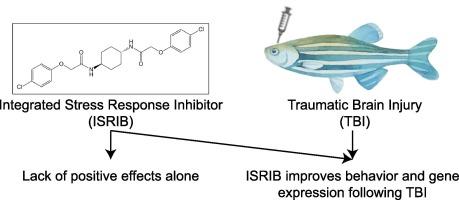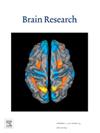Neurotranscriptomic and behavioral effects of ISRIB, and its therapeutic effects in the traumatic brain injury model in zebrafish
IF 2.7
4区 医学
Q3 NEUROSCIENCES
引用次数: 0
Abstract
Traumatic brain injury (TBI) is a global medical concern and has a lasting impact on brain activity with high risks of mortality. Current treatments are inadequate for repairing damaged brain cells or correcting cognitive and behavioral disabilities in TBI patients. Mounting evidence links TBI to the activation of the Integrated Stress Response (ISR) signaling in the brain. A novel small molecule, ISRIB, is an effective inhibitor of the ISR pathway, offering potential advantages for brain health. Here, we investigated how ISRIB affects brain transcriptome and behavior in zebrafish TBI model evoked by telencephalic brain injury. Overall, while TBI diminished memory and social behavior in zebrafish, administering ISRIB post-injury markedly reduced these behavioral deficits, and modulated brain gene expression, rescuing TBI-activated pathways related to inflammation and brain cell development. Collectively, this supports the role of brain ISR in TBI, and suggests potential utility of ISRIB for the treatment of TBI-related states.

ISRIB 的神经转录组学和行为学效应及其在斑马鱼创伤性脑损伤模型中的治疗效果。
创伤性脑损伤(TBI)是一个全球性的医学问题,它对大脑活动具有持久的影响,并有很高的致死风险。目前的治疗方法不足以修复受损的脑细胞或纠正创伤性脑损伤患者的认知和行为障碍。越来越多的证据表明,创伤性脑损伤与大脑中综合应激反应(ISR)信号的激活有关。一种新型小分子 ISRIB 是 ISR 通路的有效抑制剂,为大脑健康提供了潜在的优势。在这里,我们研究了 ISRIB 如何影响由端脑脑损伤诱发的创伤性脑损伤模型中斑马鱼的脑转录组和行为。总体而言,虽然创伤性脑损伤削弱了斑马鱼的记忆力和社会行为,但在受伤后施用 ISRIB 能显著减少这些行为缺陷,并调节大脑基因表达,挽救创伤性脑损伤激活的与炎症和脑细胞发育相关的通路。总之,这支持了脑 ISR 在创伤性脑损伤中的作用,并表明 ISRIB 有可能用于治疗创伤性脑损伤相关状态。
本文章由计算机程序翻译,如有差异,请以英文原文为准。
求助全文
约1分钟内获得全文
求助全文
来源期刊

Brain Research
医学-神经科学
CiteScore
5.90
自引率
3.40%
发文量
268
审稿时长
47 days
期刊介绍:
An international multidisciplinary journal devoted to fundamental research in the brain sciences.
Brain Research publishes papers reporting interdisciplinary investigations of nervous system structure and function that are of general interest to the international community of neuroscientists. As is evident from the journals name, its scope is broad, ranging from cellular and molecular studies through systems neuroscience, cognition and disease. Invited reviews are also published; suggestions for and inquiries about potential reviews are welcomed.
With the appearance of the final issue of the 2011 subscription, Vol. 67/1-2 (24 June 2011), Brain Research Reviews has ceased publication as a distinct journal separate from Brain Research. Review articles accepted for Brain Research are now published in that journal.
 求助内容:
求助内容: 应助结果提醒方式:
应助结果提醒方式:


